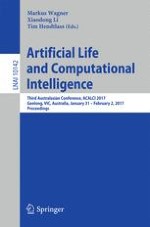2017 | OriginalPaper | Buchkapitel
Multi-objective Optimisation with Multiple Preferred Regions
verfasst von : Md. Shahriar Mahbub, Markus Wagner, Luigi Crema
Erschienen in: Artificial Life and Computational Intelligence
Aktivieren Sie unsere intelligente Suche, um passende Fachinhalte oder Patente zu finden.
Wählen Sie Textabschnitte aus um mit Künstlicher Intelligenz passenden Patente zu finden. powered by
Markieren Sie Textabschnitte, um KI-gestützt weitere passende Inhalte zu finden. powered by
